How to avoid getting scammed by pages like nicyaboyenan.com?
![]() Written by Tomas Meskauskas on (updated)
Written by Tomas Meskauskas on (updated)
What is nicyaboyenan[.]com scam?
Nicyaboyenan[.]com is a website that uses scare tactics to trick visitors into installing some potentially unwanted application (PUA). Usually, websites of this type display fake virus notifications claiming that a device is infected and offer to remove detected malware with some app.
![nicyaboyenan[.]com scam fake system notification](/images/stories/screenshots202109/nicyaboyenan-com-pop-up-scam-main.jpg)
Nicyaboyenan[.]com scam in detail
There are at least three variants of the nicyaboyenan[.]com page. One of them offers to install a VPN client, another one offers to install antivirus software, and the third one suggests that personal data stored on a device has been stolen. It is known that one of the variants is used to promote the VPN Service by VeePN application.
Usually, websites similar to nicyaboyenan[.]com are promoted through other shady websites, untrustworthy advertisements or PUAs. Either way, users rarely open these pages intentionally. Pages like nicyaboyenan[.]com can be malicious. It is strongly recommended not to visit them and ignore their notifications or offers.
| Name | nicyaboyenan.com pop-up |
| Threat Type | Phishing, Scam, Mac malware, Mac virus |
| Fake Claim | Personal information has been stolen |
| Detection Names | N/A (VirusTotal) |
| Promoted Unwanted Application | VPN Service by VeeVPN |
| Symptoms | Your Mac becomes slower than normal, you see unwanted pop-up ads, you are redirected to dubious websites. |
| Distribution methods | Deceptive pop-up ads, free software installers (bundling), fake Flash Player installers, torrent file downloads. |
| Damage | Internet browser tracking (potential privacy issues), display of unwanted ads, redirects to dubious websites, loss of private information. |
| Malware Removal (Mac) | To eliminate possible malware infections, scan your Mac with legitimate antivirus software. Our security researchers recommend using Combo Cleaner. |
Scams like nicyaboyenan[.]com in general
The main purpose of websites like nicyaboyenan[.]com is to trick visitors into installing potentially unwanted applications. Sometimes, they can be used to extract personal information or distribute malicious apps. More examples of similar scams are churrasqueirataylor[.]com, track-app[.]fun, and client-privacy[.]space.
How did potentially unwanted applications install on my computer?
PUAs are distributed by bundling them together with other programs, designing advertisements to run certain scripts and through fake installers. In the first case, users download or install PUAs when they do not deselect optional downloads or installations in "Custom", "Advanced", or other settings of downloaders or installers.
Most fake installers are promoted on deceptive websites. Advertisements that can cause unwanted downloads or installations do not appear on legitimate pages as well. Users download or install PUAs via ads by clicking on them.
How to avoid installation of potentially unwanted applications?
Programs (and files) should be downloaded from trustworthy, official websites and through direct links. Downloaders and installers with ticked checkboxes, "Advanced", "Custom" or other settings should be checked for optional downloads or installations. Advertisements on questionable websites should not be clicked.
If your computer is already infected with PUAs, we recommend running a scan with Combo Cleaner Antivirus for macOS to automatically eliminate them.
Text in the fake system notification:
(1) SYSTEM NOTIFICATION
Your personal data has been stolen!
Hit OK to protect your iPhone.
OK
Screenshot of the background page:

Text in this page:
Apple SecurityThursday
30 September 2021
Your personal data has been stolen!Third-party has access to your photos and messengers. Third-party knows your internet browser history. Stop it now!
Step 1: Tap the button below & install the recommended security application free from the AppStore
Step 2: Run the app and follow on screen instructions.
01 minutes 54 seconds
Download and Install
Detected By Apple.
Screenshot of the second nicyaboyenan.com variant:

Text in this page:
É recomendável instalar um antivírus no seu Desktop!
Segundo o DFNDR Lab, foram detectados 8 links maliciosos por segundo este ano. Para garantir sua proteção, lançamos uma nova atualização do DFNDR Security.Sem o aplicativo, seu Desktop Desktop poderá ser prejudicado e seus dados poderão cair na mão de hackers.
Instale GRÁTIS o app recomendado para limpar e reforçar a proteção do seu Desktop imediatamente!
Instalar
Ad
Screenshot of the third nicyaboyenan[.]com variant:

Text in this page:
VPN Update
Please download the VPN from the App Store and continue watching in safe mode.
Install
Screenshot of the app promoted through the first scam variant:

To enable pop-up blocking, fraudulent website warnings, and remove web browsing data in mobile Apple devices, follow these steps:
First, go to "Settings", and then scroll down to find and tap "Safari".
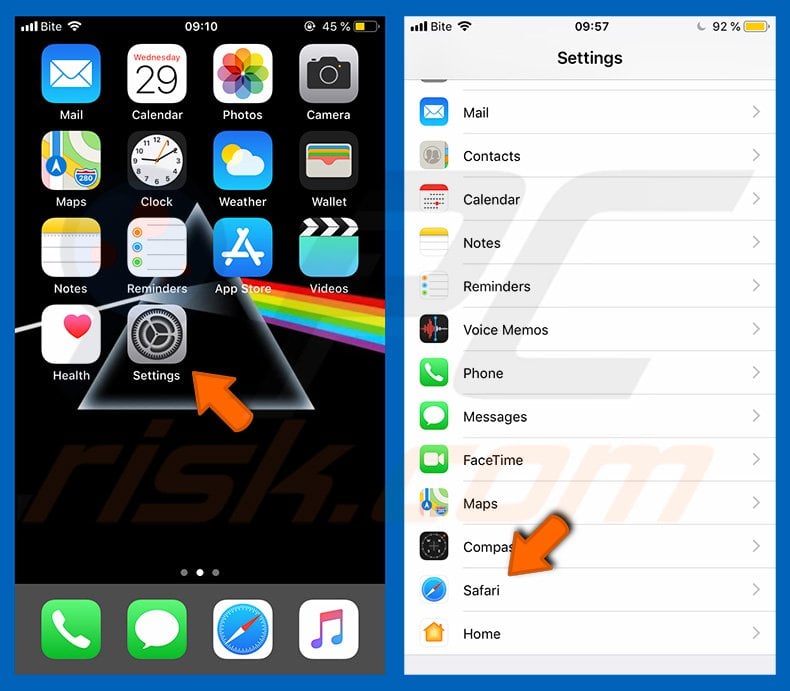
Check if the "Block Pop-ups" and "Fraudulent Website Warning" toggles are enabled. If not, enable them immediately. Then, scroll down and tap "Advanced".
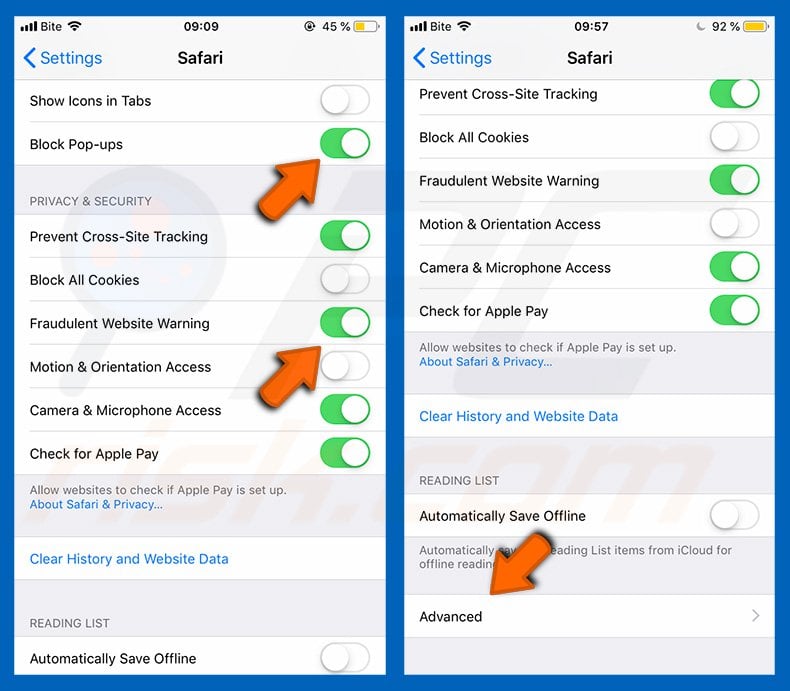
Tap "Website Data" and then "Remove All Website Data".
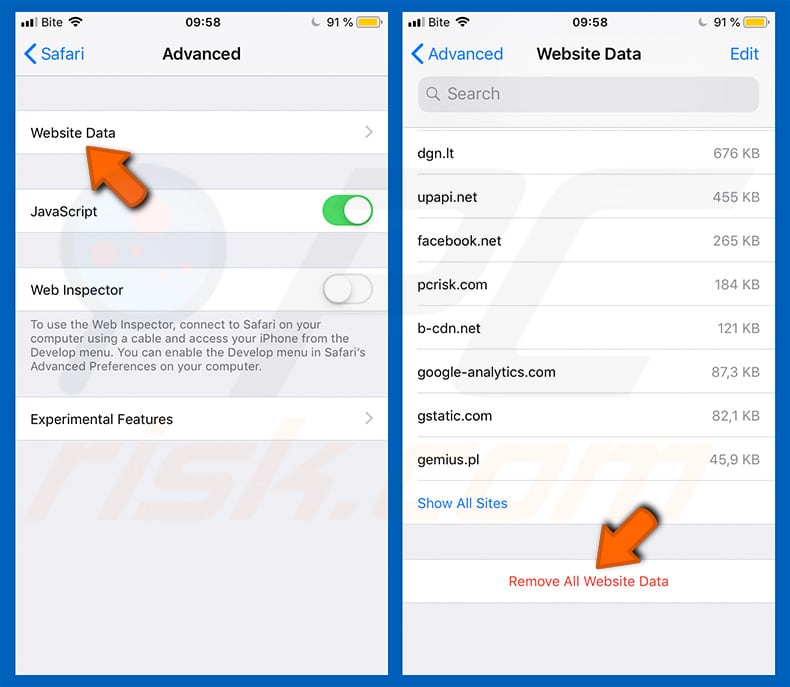
Instant automatic Mac malware removal:
Manual threat removal might be a lengthy and complicated process that requires advanced IT skills. Combo Cleaner is a professional automatic malware removal tool that is recommended to get rid of Mac malware. Download it by clicking the button below:
▼ DOWNLOAD Combo Cleaner for Mac
By downloading any software listed on this website you agree to our Privacy Policy and Terms of Use. To use full-featured product, you have to purchase a license for Combo Cleaner. Limited seven days free trial available. Combo Cleaner is owned and operated by Rcs Lt, the parent company of PCRisk.com read more.
Quick menu:
- What is nicyaboyenan[.]com scam?
- STEP 1. Remove PUA related files and folders from OSX.
- STEP 2. Remove rogue extensions from Safari.
- STEP 3. Remove rogue add-ons from Google Chrome.
- STEP 4. Remove potentially unwanted plug-ins from Mozilla Firefox.
Video showing how to remove adware and browser hijackers from a Mac computer:
Potentially unwanted applications removal:
Remove potentially unwanted applications from your "Applications" folder:
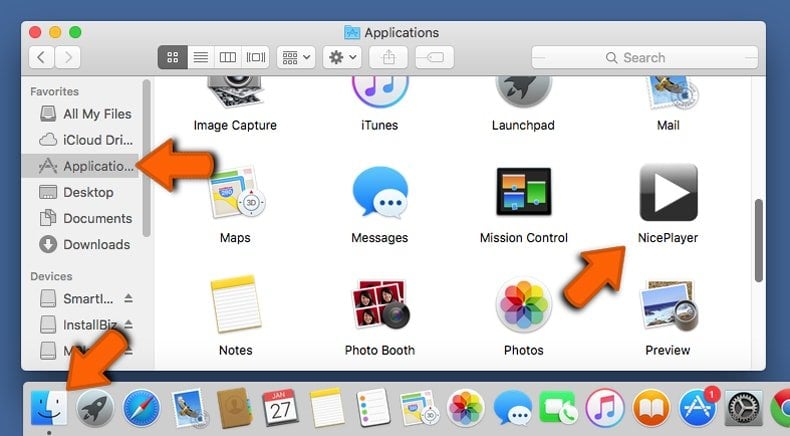
Click the Finder icon. In the Finder window, select "Applications". In the applications folder, look for "MPlayerX","NicePlayer", or other suspicious applications and drag them to the Trash. After removing the potentially unwanted application(s) that cause online ads, scan your Mac for any remaining unwanted components.
Remove adware-related files and folders
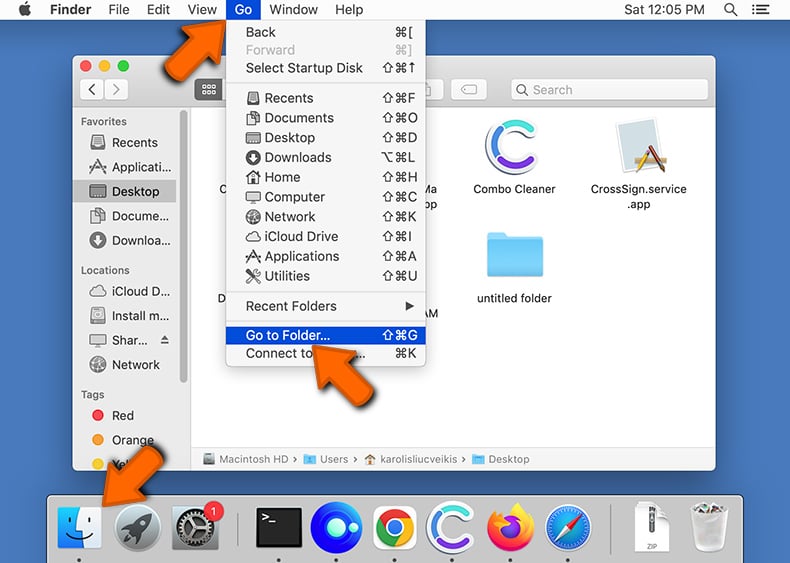
Click the Finder icon, from the menu bar. Choose Go, and click Go to Folder...
 Check for adware generated files in the /Library/LaunchAgents/ folder:
Check for adware generated files in the /Library/LaunchAgents/ folder:
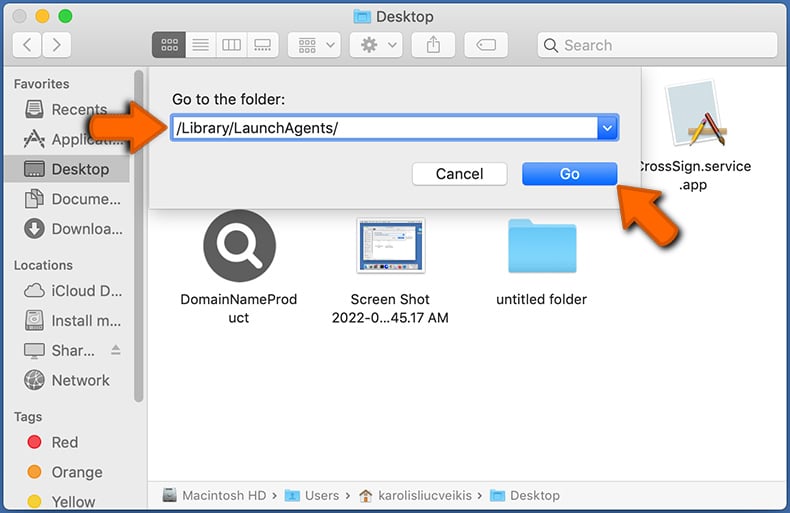
In the Go to Folder... bar, type: /Library/LaunchAgents/
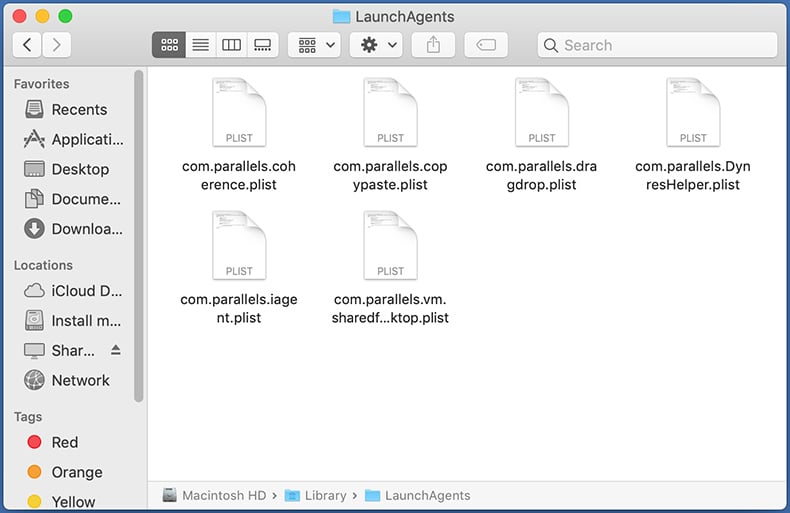
In the "LaunchAgents" folder, look for any recently-added suspicious files and move them to the Trash. Examples of files generated by adware - "installmac.AppRemoval.plist", "myppes.download.plist", "mykotlerino.ltvbit.plist", "kuklorest.update.plist", etc. Adware commonly installs several files with the exact same string.
 Check for adware generated files in the ~/Library/Application Support/ folder:
Check for adware generated files in the ~/Library/Application Support/ folder:
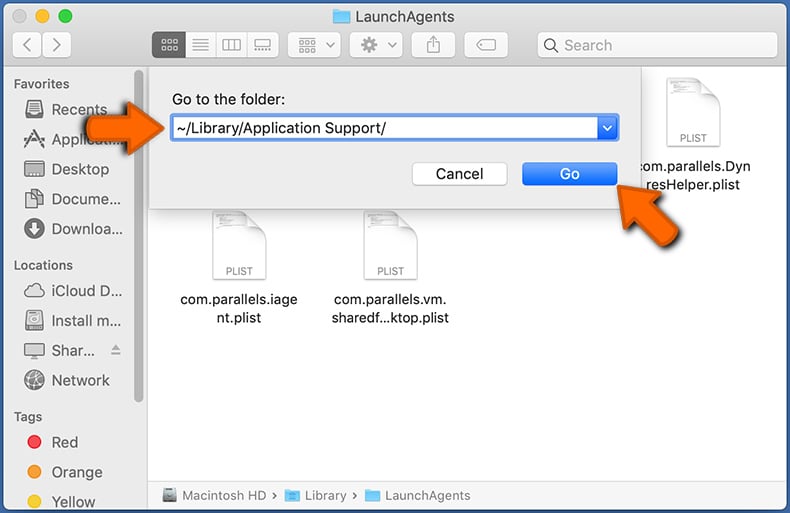
In the Go to Folder... bar, type: ~/Library/Application Support/
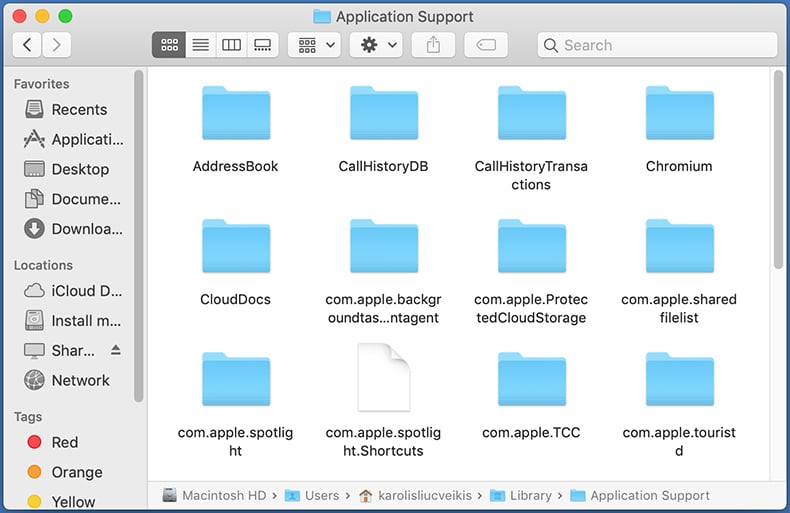
In the "Application Support" folder, look for any recently-added suspicious folders. For example, "MplayerX" or "NicePlayer", and move these folders to the Trash.
 Check for adware generated files in the ~/Library/LaunchAgents/ folder:
Check for adware generated files in the ~/Library/LaunchAgents/ folder:
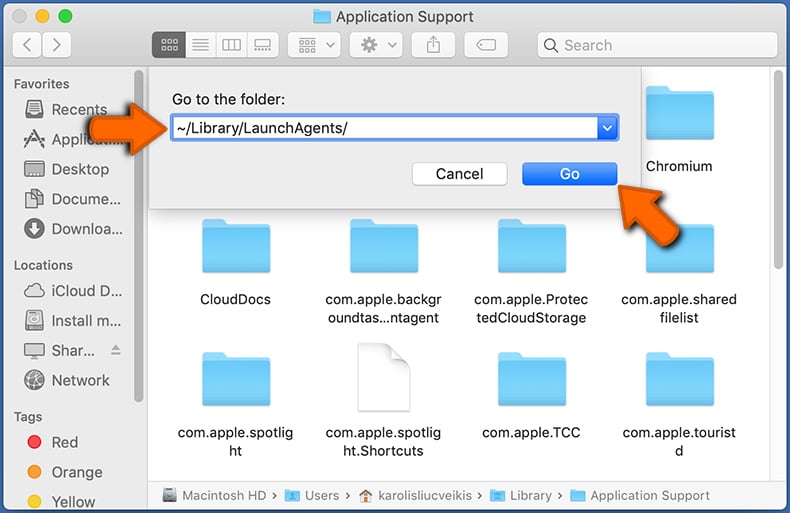
In the Go to Folder... bar, type: ~/Library/LaunchAgents/
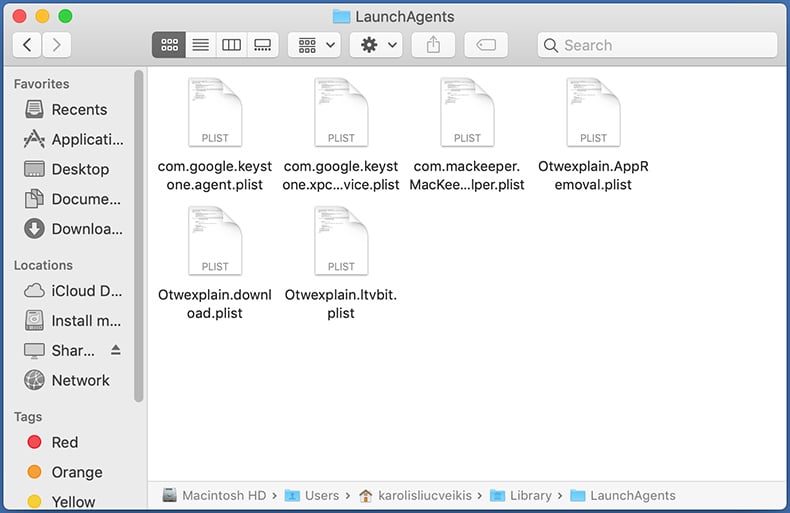
In the "LaunchAgents" folder, look for any recently-added suspicious files and move them to the Trash. Examples of files generated by adware - "installmac.AppRemoval.plist", "myppes.download.plist", "mykotlerino.ltvbit.plist", "kuklorest.update.plist", etc. Adware commonly installs several files with the exact same string.
 Check for adware generated files in the /Library/LaunchDaemons/ folder:
Check for adware generated files in the /Library/LaunchDaemons/ folder:
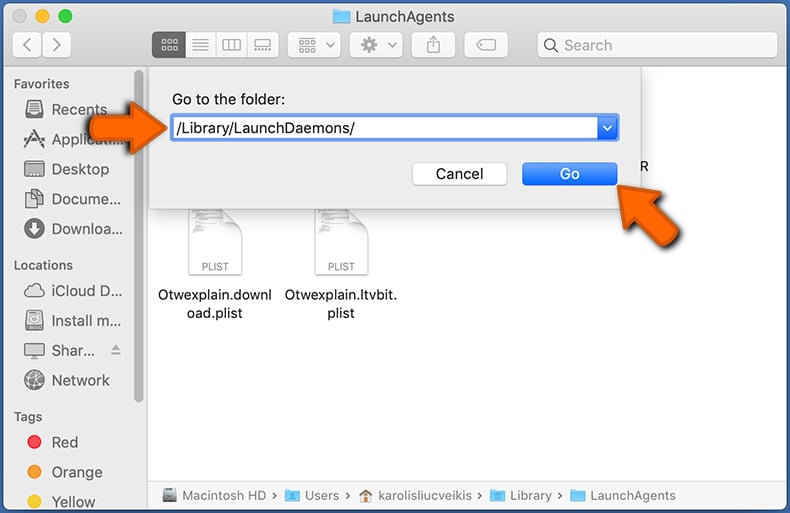
In the "Go to Folder..." bar, type: /Library/LaunchDaemons/
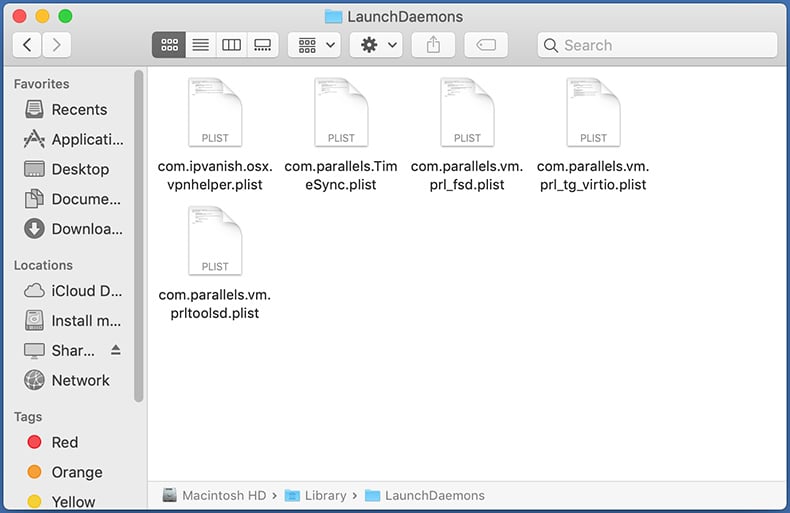
In the "LaunchDaemons" folder, look for recently-added suspicious files. For example "com.aoudad.net-preferences.plist", "com.myppes.net-preferences.plist", "com.kuklorest.net-preferences.plist", "com.avickUpd.plist", etc., and move them to the Trash.
 Scan your Mac with Combo Cleaner:
Scan your Mac with Combo Cleaner:
If you have followed all the steps correctly, your Mac should be clean of infections. To ensure your system is not infected, run a scan with Combo Cleaner Antivirus. Download it HERE. After downloading the file, double click combocleaner.dmg installer. In the opened window, drag and drop the Combo Cleaner icon on top of the Applications icon. Now open your launchpad and click on the Combo Cleaner icon. Wait until Combo Cleaner updates its virus definition database and click the "Start Combo Scan" button.
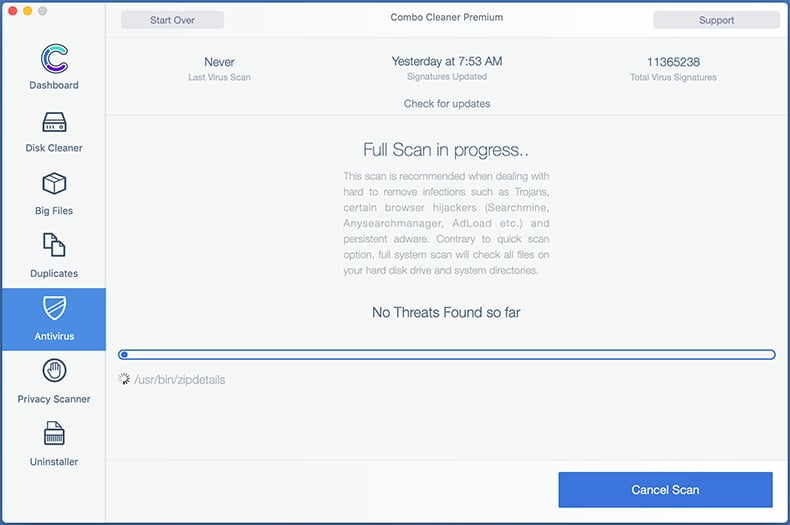
Combo Cleaner will scan your Mac for malware infections. If the antivirus scan displays "no threats found" - this means that you can continue with the removal guide; otherwise, it's recommended to remove any found infections before continuing.
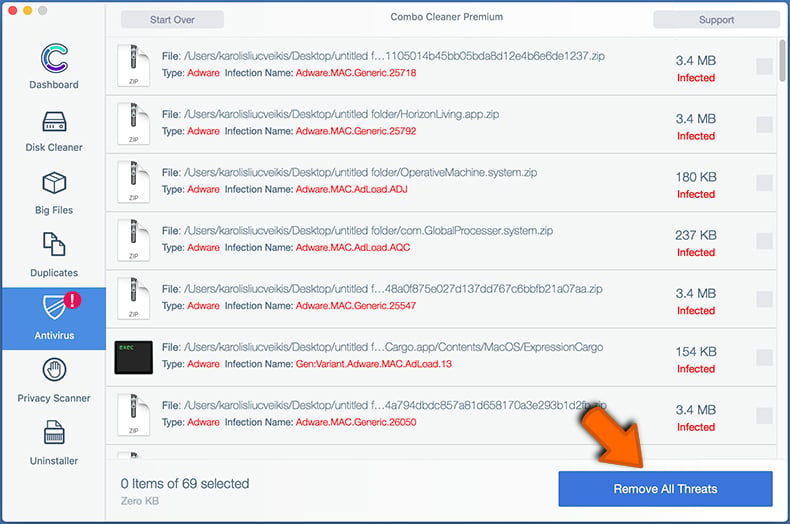
After removing files and folders generated by the adware, continue to remove rogue extensions from your Internet browsers.
Remove malicious extensions from Internet browsers
 Remove malicious Safari extensions:
Remove malicious Safari extensions:
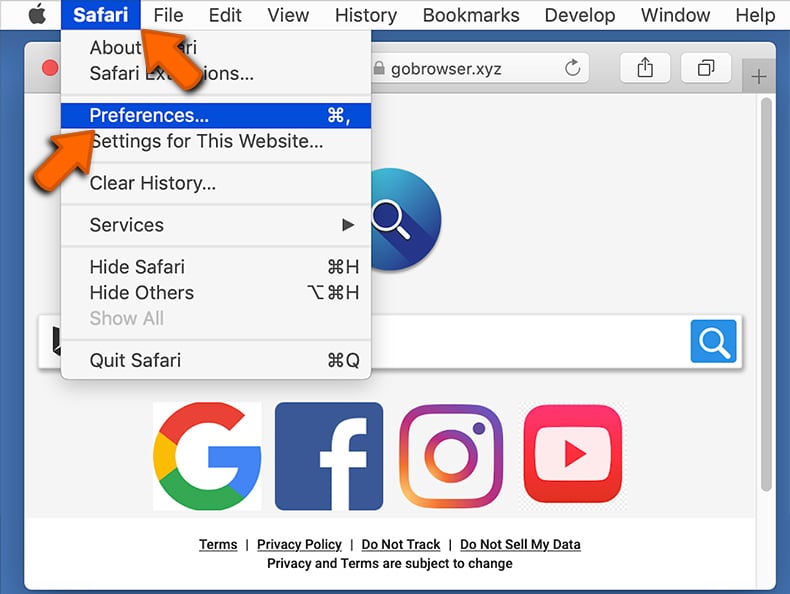
Open the Safari browser, from the menu bar, select "Safari" and click "Preferences...".
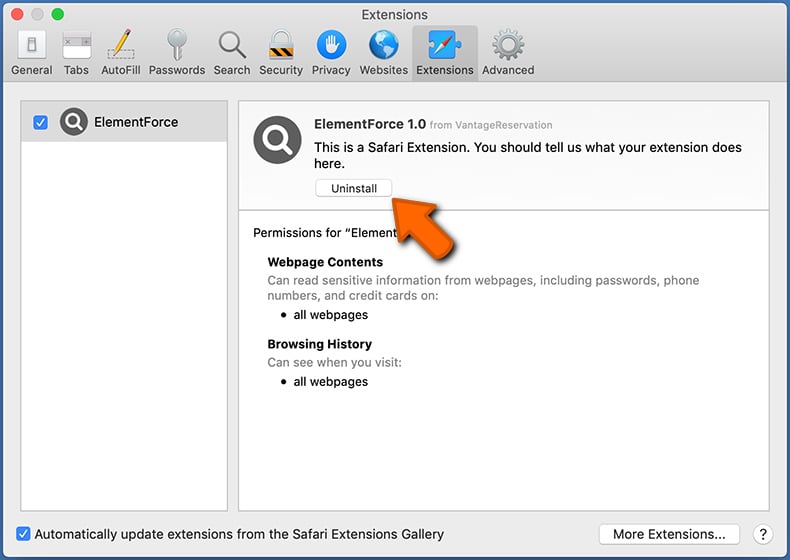
In the preferences window, select "Extensions" and look for any recently-installed suspicious extensions. When located, click the "Uninstall" button next to it/them. Note that you can safely uninstall all extensions from your Safari browser - none are crucial for regular browser operation.
- If you continue to have problems with browser redirects and unwanted advertisements - Reset Safari.
 Remove malicious extensions from Google Chrome:
Remove malicious extensions from Google Chrome:
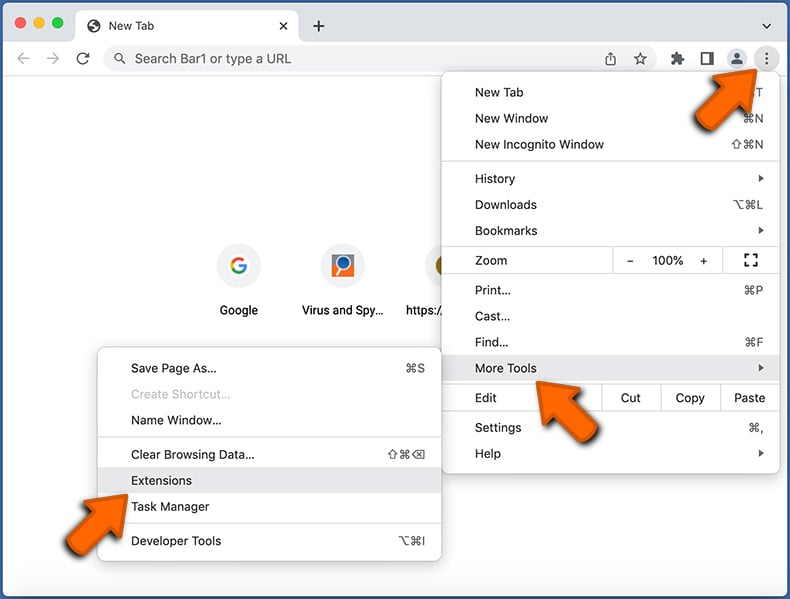
Click the Chrome menu icon ![]() (at the top right corner of Google Chrome), select "More Tools" and click "Extensions". Locate all recently-installed suspicious extensions, select these entries and click "Remove".
(at the top right corner of Google Chrome), select "More Tools" and click "Extensions". Locate all recently-installed suspicious extensions, select these entries and click "Remove".
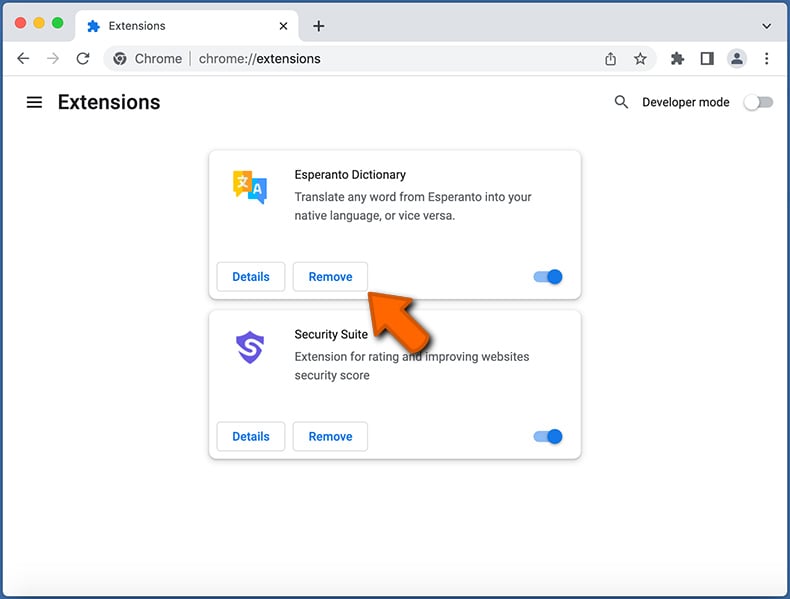
- If you continue to have problems with browser redirects and unwanted advertisements - Reset Google Chrome.
 Remove malicious extensions from Mozilla Firefox:
Remove malicious extensions from Mozilla Firefox:
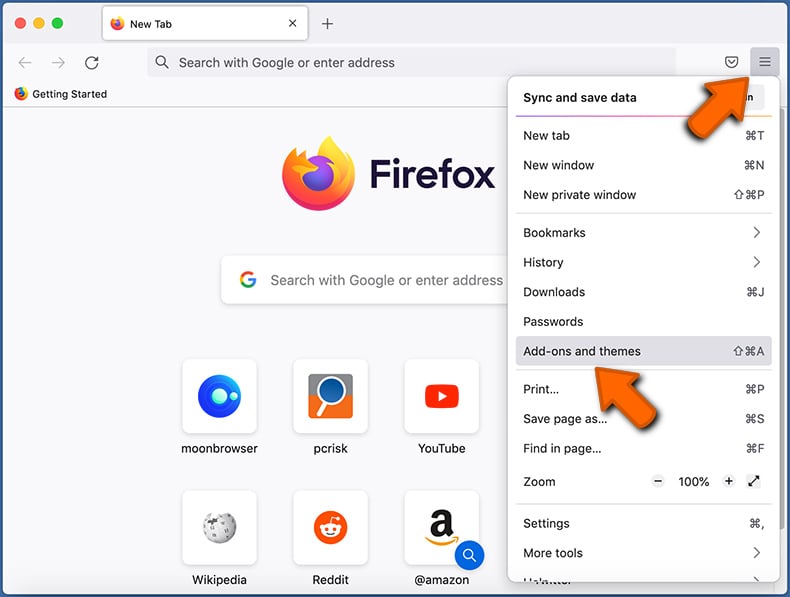
Click the Firefox menu ![]() (at the top right corner of the main window) and select "Add-ons and themes". Click "Extensions", in the opened window locate all recently-installed suspicious extensions, click on the three dots and then click "Remove".
(at the top right corner of the main window) and select "Add-ons and themes". Click "Extensions", in the opened window locate all recently-installed suspicious extensions, click on the three dots and then click "Remove".
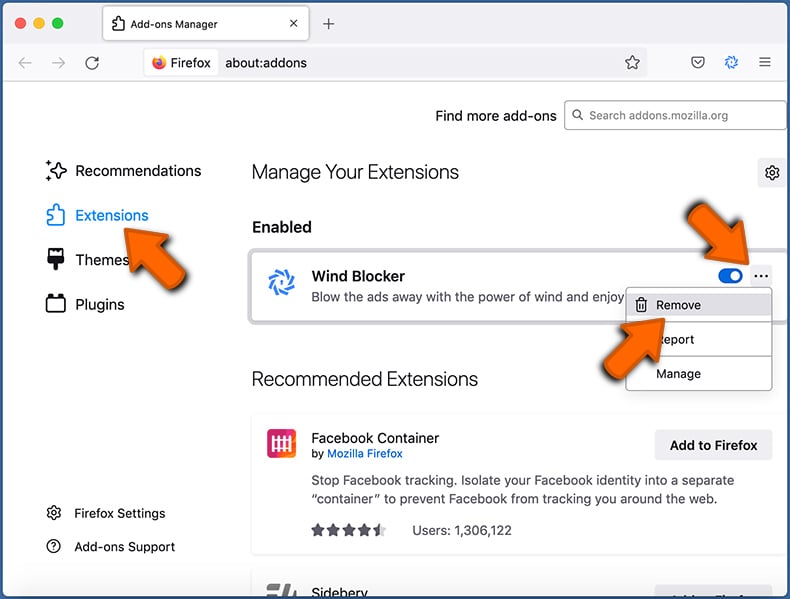
- If you continue to have problems with browser redirects and unwanted advertisements - Reset Mozilla Firefox.
Frequently Asked Questions (FAQ)
What is a pop-up scam?
Pop-up scam is basically a deceptive message displayed by an untrustworthy website designed to trick users into providing personal information (like credit card details, names, surnames), downloading files, installing unwanted software.
What is the purpose of a pop-up scam?
Pop-up scams are mostly used to either distribute malicious software or extract personal information that could be sold to third parties or misused for other malicious purposes (for example, identity theft).
Why do I encounter fake pop-ups?
Most pop-up scams are delivered by untrustworthy, potentially malicious websites that users open unintentionally. Also, these scams can be promoted through installed malicious applications or while visiting sites that use questionable advertising networks.
Will Combo Cleaner protect me from pop-up scams?
Combo Cleaner is designed to scan every single website you visit, and it is capable of detecting the malicious ones. Sites designed to deliver pop-up scams also fall under this category. Thus, you will be warned immediately and the access will be restricted.


▼ Show Discussion